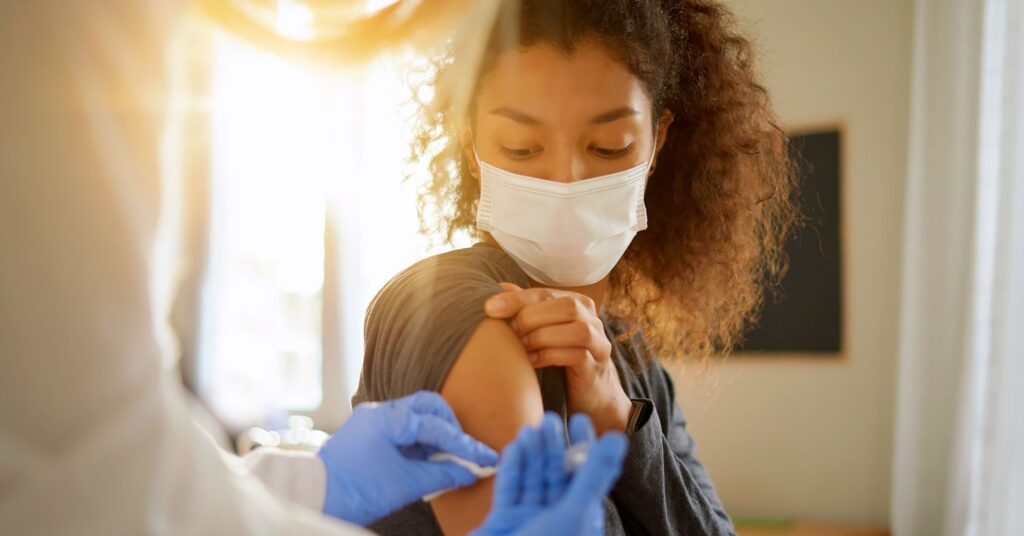The world’s first plant-based vaccine against COVID-19 has been approved for use in adults ages 18 to 64, exclusively in Canada.
The vaccine, branded as Covifenz, consists of two doses and is made by Medicago, a Quebec-based privately held company. It also uses an adjuvant—the ingredient in a vaccine that helps improve the immune system’s response—made by the British pharmaceutical giant GlaxoSmithKline.
Many people have been waiting for a COVID vaccine that is both ethical and doesn’t contain animal ingredients. Clinical trials for vaccines involve human volunteers, but before they reach that stage, their safety and efficacy must be tested on animals, per the FDA as well as guidelines worldwide. So, there’s still no such thing as a vegan COVID vaccine. And, yes, you should still get vaccinated. Any vaccination is better than none. But don’t take my word for it. The scientific community is unanimous in recommending adults and eligible children to be fully vaccinated—and in some cases boosted—for the best protection against COVID-19 symptoms and spread.
But as we’ve seen throughout the pandemic, which now ranks among the deadliest in history, not everyone has gotten vaccinated. A new plant-based vaccine offers yet another option—and that’s a good thing. But, as we enter year three of the pandemic, does this new vaccine offer reliable protection against COVID-19?

Does the plant-based COVID-19 vaccine work?
A late-stage trial of the Covifenz vaccine, which studied 24,000 adults, found that the overall efficacy rate is 71 percent against all variants, and 75.3 percent effective against Delta. The exception is the fast-spreading Omicron variant, which was not as prevalent when the study took place. However, Medicago notes that it is preparing to study a version of the vaccine tailored to Omicron.
How does this compare to other vaccines? Clinical data has shown an efficacy rate of 95 percent for Pfizer, 95 percent for Moderna, and 66 percent for Johnson & Johnson. These numbers don’t account for Omicron either, because it simply wasn’t around at the time that they were developed. But, a study published in the journal Cell showed that the third booster shot may increase overall immunity against the virus. All of the vaccines share the same general side effects: redness or soreness at the site of injection, chills, fever, joint and muscle pain, nausea, sore throat, and fatigue.
Medicago has agreed to supply the Canadian government with up to 76 million doses of the vaccine, making it the sixth COVID-19 vaccine approved by the country.
What is a ‘plant-based’ vaccine?
Plant-based vaccines are still a new innovation. In fact, the plant-based coronavirus vaccine is the first of its kind. While Covifenz is plant-based, per regulations surrounding vaccines, it is tested on animals. (Vaccine trials for COVID-19 have relied on research on mice, hamsters, and nonhuman primates.) In other words, it’s not a vegan vaccine. “Plant-based” just refers to how the shots are made. So, how do they differ from other kinds of vaccines?
Traditionally, vaccines like the flu shot contain weaker or inactive parts of a particular disease, called antigens, which are introduced to the body via injection, stimulating an immune response against a specific infection. When the body produces disease-specific antibodies, it “remembers” that invader, so if the immune system once again encounters that disease, the response time is faster and more effective. Notably, most conventional flu shots are produced using egg protein.
The Covifenz vaccine, however, utilizes live plants as bioreactors that produce virus-like particles (VLP) that mimic the genetic structure of COVID-19, triggering the body’s immune system to fight against it. There’s no egg—or actual virus—involved in the production. Medicago uses Nicotiana benthamiana plants, a close relative of tobacco, to grow the VLP.
There are currently 10 COVID-19 vaccines approved by the World Health Organization (WHO), which are made using a variety of methods, ranging from ones that use the inactivated virus (like Sinovac) to ones that use a non-replicated viral vector that contains genetic material packaged inside a harmless virus that cannot copy itself. Pfizer and Moderna both of which are egg-free, use genetically engineered messenger RNA (or mRNA for short), which teaches the body’s cells how to make the “blueprint” for a protein found on the virus’s surface, causing the immune system to create antibodies in response to the invader.

What’s different about plant-based vaccines?
The WHO describes the development of plant-derived shots an “exciting possibility.” This is because they could come with several advantages.
For one, VLPs used in plant-based vaccines don’t contain the core genetic material of a virus, so they’re not infectious and they cannot mutate. The vaccines can be produced cheaply, in bulk, and in a matter of weeks compared to up to six months for egg- and cell-based production methods. And, unlike conventional vaccines, they don’t need to be kept cold—all key factors that researchers have highlighted are critical to tackling COVID-19.
This temperature stability also has an added beneficiary: the environment. Vaccines are kept frozen using a gas called hydrofluorocarbons, which have a global warming potential of up to 23,000 greater than carbon dioxide, according to the European Commission.
A study published in the journal Human Vaccines and Immunotherapies highlights that plant-based vaccines have the potential to fulfill emergency demands, like the current pandemic and future outbreaks. However, there are a few roadblocks in the way of plant-based vaccines becoming widespread, such as selecting the right plant to host VLPs, the availability of manufacturing facilities, and public acceptance, which has faced challenges in recent years via the spread of misinformation on social media.
Medicago intends to apply for approval of Covifenz in Japan and is also “in talks” with authorities in the US, EU, and Asia, bringing more vaccine options to the masses. COVID-19 has infected all corners of the world, so pragmatically, more options are a good thing. But no matter which jab you get, the bottom line remains: the science has shown that being vaccinated greatly reduces our risk, and the spread, of infectious diseases.


